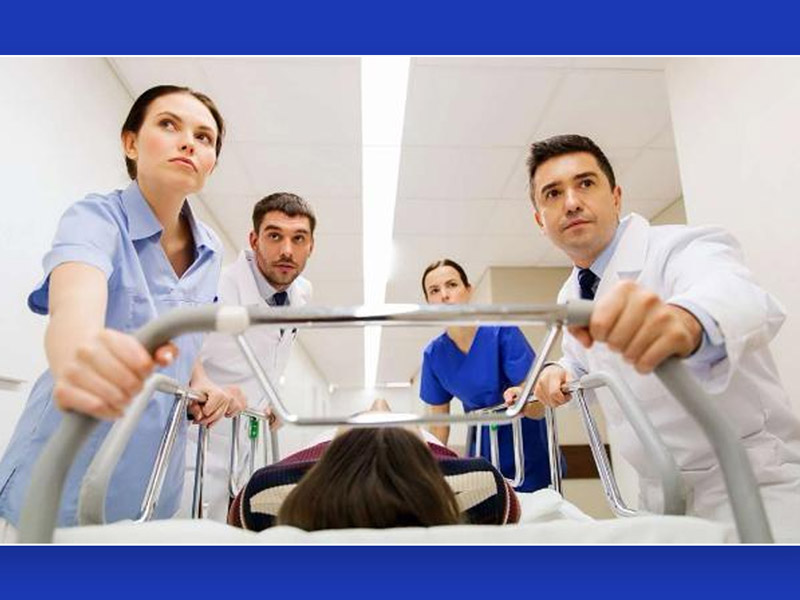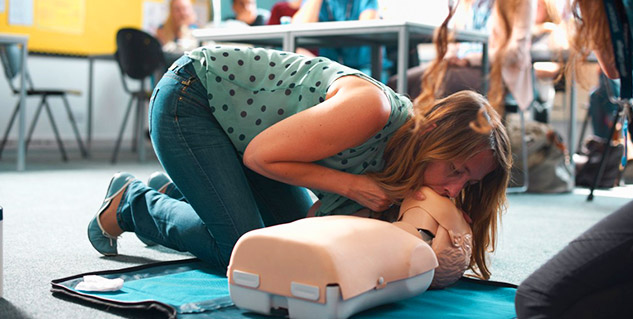
We all wish to stay safe but a medical emergency can arise anywhere with anyone. It can be anything from a cut, fracture, organ failure, burns, sudden unconsciousness and many others. Emergencies can also arise due to natural calamities as well as because of someone's fault like electrocution. When you come across an emergency, you must follow the three C's chronologically - Check - call - care. You should check for the well being of the patient, call for professional help and then focus on doing whatever is possible at the moment to stabilise the situation.
Table of Content:-
You should keep in mind the three P's too - Preserve life-preserve detoriation-promote recovery. It means that firstly you should take necessary steps to save the life of a person. The second step is to control the situation from worsening and then to take action for the recovery of the patient. A medical emergency is always unforeseen, so we must stay prepared for them. Areas such as certain workplaces like kitchen and garage that are more prone to accidents, should be equipped with proper first aid. Around 1/4 of the accidents become fatal because they do not get the right help at the right time. Read on to know about some important tips to deal with medical emergencies.
Tips to deal with medical emergencies
We have listed below 7 tips to handle medical emergency situations:
1. Identifying the cause and the nature of the problem
Different problems need different solutions. You should try to find out the main cause behind the problem. If the person is conscious, you can ask him/her directly. If a person is getting unconscious, look for injuries on ths body and check for insect bites. You should also pay attention to the symptoms. For example, if a person is suffering from heart attack, they may complain about chest pain. While a person who has choked himself on something may look confused and gasping for breath. Unless and until we identify the problem, we won't be able to comfort the patient.
2. Making sure that the airway is unrestricted

We should ensure that the air passage is not restricted in case the person has drowned or swallowed something. In case of drowning, you can lay the person on their back and thrust to push water out of their system. You should not make a crowd near the person. In case of fainting, you should loosen up the clothes and let the person breathe and relax. In case an individual swallows or restricts nasal passage, you should not try to remove the object yourself. You can pat the person so that he can cough out the object.
Also read: Keep These Medical Devices At Home For Emergency Situations
3. Call the emergency number immediately
In cases of emergency, you should call for medical help immediately. Once you call the ambulance, you can get back to the patient and try to pacify him. You should not at all delay calling the ambulance as getting medical help at the right time can help you save a person's life. If you are not sure about what the person is suffering from, you can make him lay down in a comfortable position. In case of fractures, you should not try to move the broken limb. In case the patient is bleeding, you can try to lift up the body part above the level of heart as this can help in controlling the bleeding.

4. Stay calm
Staying calm around a patient is really important. You must not panic around the patient, it can also make him more anxious. Being calm will help you as you have to be more thoughtful and figure out the solution. You can also make the person take deep breaths. Reacting emotionally during a situation might also cause problems. You should try not to surround the patient or constantly nag him with way outs. You should understand that he is in pain, and he might not be in a situation to follow.
Also read: Don't Turn a Blind Eye to Medical Emergencies, Here's How you can Deal with Them
5. Look for the medical kit
Once you have called for professional help and seated the patient comfortably, you should start looking for a medical kit around you. In case of deeper injuries, you can cover the wound with cotton pads and apply pressure to stop bleeding. You should try to keep the person conscious by continuously comforting him and talking to him. You can try giving the patient basic ORS solution/glucose. If the person is diabetic, you should prefer giving water, because other solutions can have an impact on the sugar levels.

6. Protect yourself and check for any danger
In an emergency situation, you need to think more practically. If you come across a situation like flood, fire or earthquake, you should initially make yourself safe and then concentrate on helping others. Firstly, you should try to protect the person and yourself from further damage. For example, taking the person away from place of fire. You should also check around yourself for any other fatal hazards. If we are not aware, we can get stuck into other problems as well.
Also read: Top 10 Health Insurance Queries Resolved By Expert
7. Keep a first aid box ready
One must always prepare for any upcoming challenges. You should always keep a first aid box ready with all the required medicines, bandages, cotton pads etc. First aid box should not be loose because in the time of emergency, it becomes difficult to find things because of limited time. First aid box should be kept at a place which is known by all members of the house. You should keep it away from small kids as they can hurt themselves. You must check the medicines and ointment for their expiry date and keep replacing them from time to time.
In any medical emergency, you should not take unprescribed medications because they can worsen the situation. We should stay cautious and aware about our surrounding and put our health at the first place to avoid such situations. People should take appropriate precautions like, heart patients should always carry their medicines. People who develop allergies should carry prescribed medicines and asthma patients should carry their pumps. Every individual should atleast know the basics of first aid, because it will help you as well as others in the time of crisis.
Read more articles on Miscellaneous
Also watch this video
How we keep this article up to date:
We work with experts and keep a close eye on the latest in health and wellness. Whenever there is a new research or helpful information, we update our articles with accurate and useful advice.
Current Version